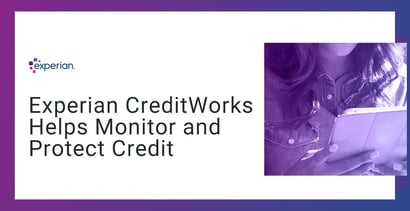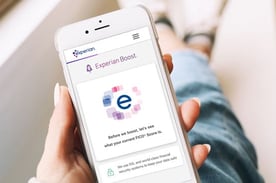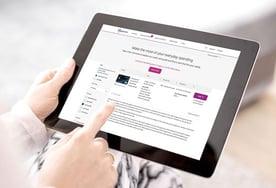

In a Nutshell: Credit is a fundamental component to financial and social well-being, yet it remains poorly understood by a huge swathe of the population. Experian CreditWorks is an online suite of tools that helps people not only understand their credit but improve and protect it. By improving credit, consumers can save money — up to $200,000 over their lifetime — in interest and fees. Experian’s Credit Match tool helps users locate credit and loan products that meet their needs and help them build a positive credit history. And the Credit Lock feature enables them to protect their identity and credit profile by stopping new credit accounts from being opened. This helps good scores remain high and improves lower scores.
According to a study published by Lending Tree in January 2019, 37% of Americans don’t understand how credit works. That should come as no surprise — personal finance is rarely covered in public school or college curricula. And if a parent doesn’t understand credit, they can’t adequately prepare their children to deal with it as adults.
This lack of knowledge places the burden of education on financial institutions like banks and credit unions. And while these institutions do conduct outreach to customers, members, and the public, the population at large is under no obligation or compulsion to avail themselves of institution learning tools and resources. In fact, intimidating learning tools often push consumers further from positive credit and financial wellness.
 But ignorance doesn’t change the fact that credit is a crucial component of the modern world, and its impact is felt in the area of personal finance and in life in general. When it comes to personal and financial well-being, credit is one of the most important tools at our disposal for saving money and securing a stable future.
But ignorance doesn’t change the fact that credit is a crucial component of the modern world, and its impact is felt in the area of personal finance and in life in general. When it comes to personal and financial well-being, credit is one of the most important tools at our disposal for saving money and securing a stable future.
“People don’t teach it in a high school class or in a college class even,” said Kevin Everhart, VP of Marketing at Experian. “And it’s ironic because it can have such an impact on your life if you don’t know how to build your credit effectively and manage it.”
Experian CreditWorks is designed not only to educate consumers about credit but to serve as a tool for improving their credit and their overall financial situation. Its approach is founded on four pillars: help consumers understand their credit, improve it, connect to products that fit their needs and situation, and safeguard against fraud and scams.
“Someone can save over $200,000 over their life when it comes to credit,” Everhart said. “So it’s incredibly important, and we believe that we can help people do better with credit.”
Credit is the First Step to a Better Score
“I think a lot of people that struggle with credit find that it’s worth the return on investment to improve it because they can save so much money,” Everhart said. “We do so much consumer research and understand the pain points that consumers have related to credit. It really depends on the individual and where they are in their journey.”
The end goal of the credit journey is, of course, a prime credit score. The much sought-after rating of 800 or higher means the consumer has greater access to a variety of credit products that help them save money, avoid debt, and maintain or even improve their score.
These are all things that people with lower credit scores desperately seek. Unfortunately, this means lenders see them as a greater risk. As a result, consumers with low credit scores can expect to pay higher fees and interest rates on credit products.
Experian CreditWorks’s goal is to help consumers understand these and other facets of credit. By doing so, it can help them not only raise their score but understand the mechanisms and benefits of a higher score.
“We have the opportunity to help people improve their credit,” Everhart said. “This is where people find that it is worth money to them. Because if you can move from one credit band to another, you can oftentimes save a significant amount of money every month on an interest rate alone. So it can quickly pay for itself based on the savings that somebody can earn.”
Subscription and Utility Bill Reporting Provide a Boost
One of the biggest factors in improving credit scores is consistent, timely payment of bills.
According to MyFico.com, payment history accounts for a whopping 35% of an individual’s credit score, making it a crucial factor in determining and improving creditworthiness.
Making on-time mortgage and credit card payments is probably the simplest way consumers can boost their credit scores. But these are not the only bills that people regularly pay. Utility bills are payments that consumers make on a regular basis, as are rent and subscriptions to Netflix, Spotify, and other services.

Experian Boost helps users raise credit scores by reporting items such as utility payments and subscription service payments.
These can also be leveraged to improve credit scores — if the consumer knows how to do so. Experian Boost makes it easy to import data from financial accounts, qualify them as trade lines (provided that the history is three months or longer), and have them factored when credit scores are calculated.
“The easiest way users can provide that additional trade line information is to connect their bank account credentials in a very secure way, where we can actually work with the trade lines that appear on their statements,” Everhart said. “We can identify whether they’ve made consistent payments to their gas and electric utility, or to their cable company, or internet provider. And then the data is actually documented as a new trade line.”
Users have full control over which of these trade lines are accounted for in their credit reports at all times. They are able to add new ones and remove old ones whenever they wish.
By having more control over factors that may have not previously been counted toward an individual’s credit score, including regular, timely payments for utility services, cable, and internet, consumers can see positive changes.
“To be able to use (additional payments) on their own behalf to help them improve their overall credit health is something we were super excited to be able to launch,” Everhart said.
Product Matching Connects Qualified Consumers with Better Credit Opportunities
“Based on the latest statistics, about 35% of consumers are in the subprime category of credit,” Everhart said. “They’re struggling, and we know the pandemic has only made things more challenging. And we believe a great credit product can help people take control of their credit and ultimately take better control of their financial health.”
Everhart said that somewhere between 10% and 20% of consumers who come to Experian are actively seeking recommendations on loans and credit cards they can qualify for. CreditMatch is a quick, convenient way for Experian to help connect those individuals with the credit cards and loans they seek.

Experian CreditMatch connects consumers with credit cards and loans best suited to their financial needs and situation.
“CreditMatch is, for us, almost like the ultimate matchmaker between consumers and financial institutions in terms of matching them with financial instruments that are best suited to their needs,” Everhart said.
Experian’s recommendations are based on what it believes will be most beneficial for the consumer, not based on partnerships and commissions. As with the entire suite of CreditWorks tools, the purpose is to help people master their credit and improve their finances.
“Let’s say someone’s looking for a reward card,” Everhart said. “Which one might actually be the best option for them based on where they stand with their credit? If it’s excellent, or if it’s just only fair or good, we try to align that consumer with the best option. And we have a very comprehensive inventory of cards and loans in our marketplace for consumers to choose from.”
Experian CreditWorks: Enhanced Security Features Protect Against Fraud
Building credit is a crucial task, but whether your credit is strong or subprime, protecting it from harm is a fundamental component of personal finance. If your credit is good, fraud or a security breach can be extremely damaging. And if your credit is poor, these instances can be momentous setbacks to achieving a higher score.
“If people have challenges with fraud, or people have issues with their identity being stolen, being able to monitor their credit is an incredibly important facet of the product,” Everhart said. “We have tools that make us unique and help consumers feel more at ease and confident with their credit.”
One of these features is CreditLock, which allows users to lock and unlock their credit lines at the tap of a button. With a CreditWorks membership, Experian will alert the consumer if their credit has been accessed and/or a new account opened as part of the monitoring service. If it’s locked by the consumer using CreditLock, the system will alert that an attempt at access has been made but stop a new account from being opened.
Advertiser Disclosure
BadCredit.org is a free online resource that offers valuable content and comparison services to users. To keep this resource 100% free for users, we receive advertising compensation from the financial products listed on this page. Along with key review factors, this compensation may impact how and where products appear on the page (including, for example, the order in which they appear). BadCredit.org does not include listings for all financial products.
Our Editorial Review Policy
Our site is committed to publishing independent, accurate content guided by strict editorial guidelines. Before articles and reviews are published on our site, they undergo a thorough review process performed by a team of independent editors and subject-matter experts to ensure the content’s accuracy, timeliness, and impartiality. Our editorial team is separate and independent of our site’s advertisers, and the opinions they express on our site are their own. To read more about our team members and their editorial backgrounds, please visit our site’s About page.




